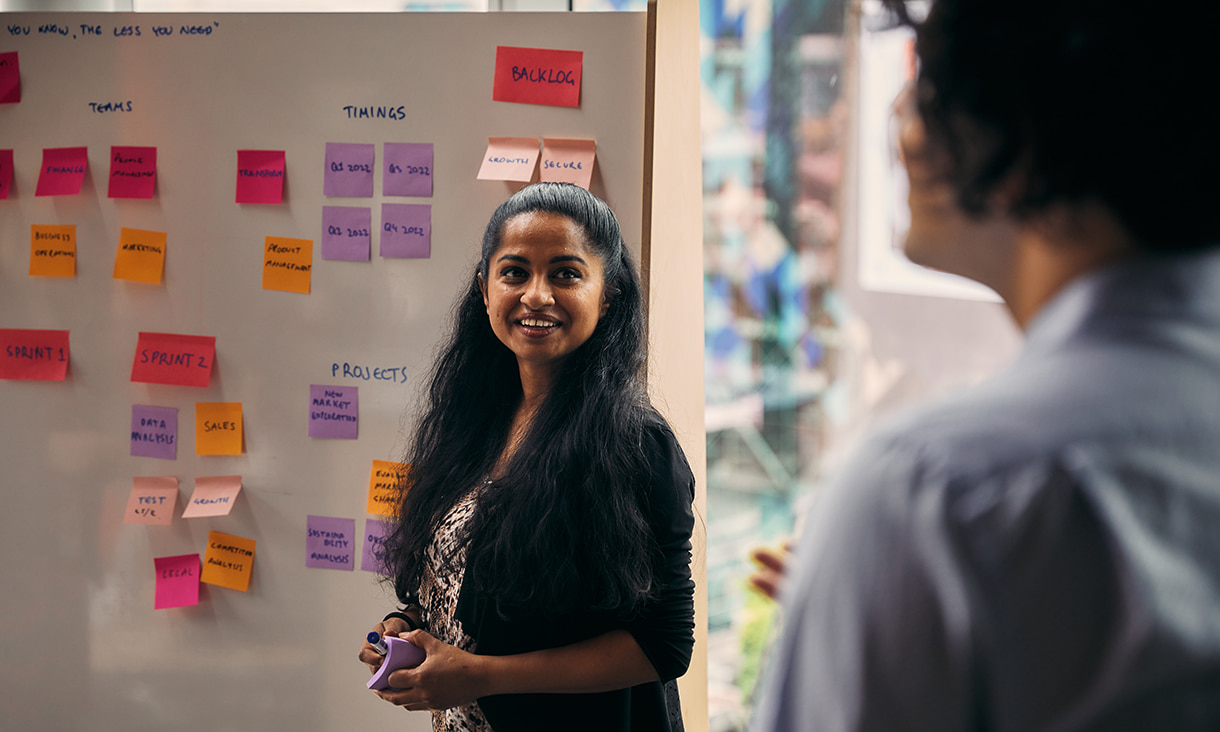As the new year rolls in, how will you prepare to shape what’s next? Explore the possibilities of tomorrow by setting goals to achieve your dream career.
As you consider the year that has been, you might have already brainstormed some goals you’d like to accomplish. And if learning a new skill, getting a new job or hitting the gym made the list, you’re definitely not alone.
Achieving your resolutions is all about setting meaningful goals: ensuring you don’t just draw a picture of paradise, but also stay realistic.
RMIT University can help you fulfil those career goals you’re yearning to accomplish. Here are some of our best tips for setting career goals and bringing your vision of the future to life.

1. Reflect on your achievements and consider your career goals
Take some time to reflect on the positive impacts you’ve had in your career in the last 12 months.
Whether you mentored a team, found creative ways to deal with tough customers or picked up a new passion or hobby, acknowledge that you’ve made improvements to the way you and the people around you have worked.
Setting career goals for the next 12 months is a great way to keep the ball rolling on your positive takeaways, and could provide clarity help you aim for new heights in the year to come. Your goal could be as small as wanting to continue building collaboration skills, or it could be as big as recognising you’d like to take your expertise to a new industry.
How you can achieve your goals at RMIT
Whether your next career goal is to shake things up or move a step up, at RMIT there are over 350 qualifications to choose from that will get you there.
Not sure which level of study suits you? Vocational study can help you gain specific skills in as little as six months. Undergraduate study can help you break into your dream industry, while postgraduate will enable you to take the next step into a higher-paying role.
“I wanted to learn design software and I had many light bulb moments in the course when the teachers sat down to show me how things work,” said RMIT alum Diploma of Graphic Design, Alice Oehr.
“I wanted to get skills and be a well-rounded designer. I was a little bit older and I was ready to work and make stuff and the TAFE course was the perfect vehicle for that.”
2. Consider your gaps in skills and knowledge
Reflecting on areas of improvement can also provide a strong foundation for goal setting. Make a list of things you currently find challenging. Do they correspond to any soft or hard skills? Does your current job still provide you with the ability to grow and learn these skills?
Pair each challenge you’ve listed with actionable steps you can take to fill those knowledge gaps. For example, if you’d like to pick up a technical skill, is there a course you can take to learn it? Perhaps you’re looking for an entry point to the legal profession or to deepen your understanding of the framework of law with a course like a Juris Doctor.
Another example comes from RMIT Master of Analytics student Ting Li whose career goals were to expand her tech expertise. She identified the specific skillset she wanted to explore and coupled it with a course that could help her achieve this goal.
“As someone crossing over to STEM with a background in education," said Ting Li, "it was encouraging to see that the program at RMIT welcomes and includes everyone, no matter what their previous experiences are.”
How you can achieve your goals at RMIT
In addition to practical learning in industry-led courses, all RMIT students have access to impactful resources that can help you fill your skills gaps, such as the Career Connect. Here, you’ll be able to book in consultations and workshops with our dedicated Careers Counsellors. You can get your resume and cover letter reviewed, workshop your LinkedIn profile, search for job opportunities, practice interviews or even discover job-ready programs such as RMIT Plus.
 Keeping an eye on industry trends puts you ahead of the pack
Keeping an eye on industry trends puts you ahead of the pack
 The new year is the perfect time to consider what's next
The new year is the perfect time to consider what's next
3. Keep researching jobs and stay updated on trends
Do your research on the latest skills in demand and forecasted industry trends. Consider how technologies like blockchain could affect your industry, and how upskilling in these areas might benefit your career in the long term.
Once you’re aware of the trends likely to affect you, you can set learning goals that will keep you ahead of the curve and at the forefront of change.
“RMIT set me up for great success in both my professional and personal life,” says RMIT Bachelor of Business alum Kae Hum.
“I think it’s given me great skills to not just learn about the theory but learn how to learn. I think that’s something that’s always stayed with me.
That cross-section of business information systems, where I was able to learn about both business and technology, has put me in good stead in the first half of my career.”
How you can achieve your goals at RMIT
RMIT’s certificates, diplomas and degrees give you the means to master new and future trends, providing you the tools to pursue a range of career paths and opportunities. After gaining your qualification from RMIT, you’ll be ready for whatever the future holds.
As an RMIT student, you'll have access to CareerHub: an exclusive platform where you can search for new job opportunities. Through CareerHub, you can also book to attend career fairs, workshops and industry events, where you can hear directly from leading employers about forecasted trends and employability factors. Examples of employers who have presented at RMIT’s campus include EY, ZARA, Disney, Facebook, CPA, Department of Defence, Port Phillip Publishing, Lucasfilm, and Metro Rail.
Explore the qualifications that will help you reach your career goals for the new year.
Story: Pallavi Daniel and Jacob Johnston



